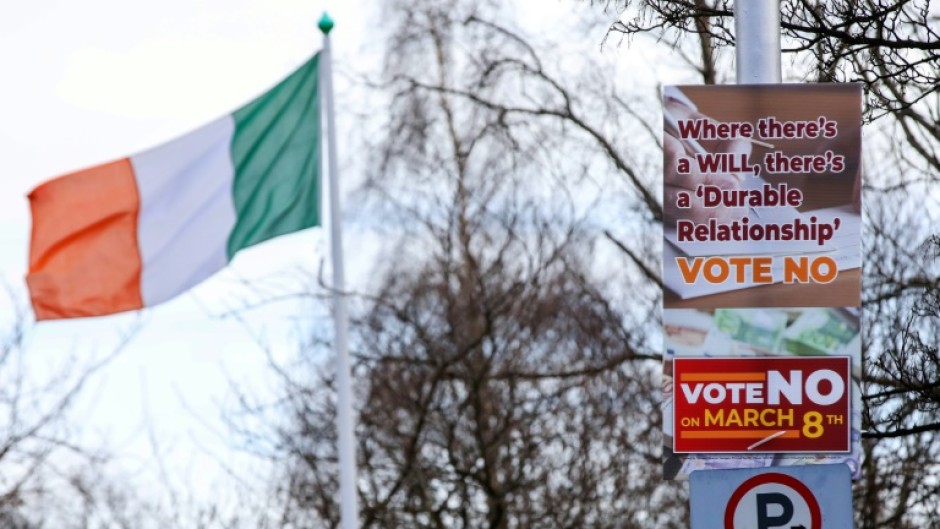DUBLIN - Early tallies from a dual referendum in Ireland on redefining family and women's roles showed a trend towards a "No" vote and a defeat for the government on Saturday.
The votes are the latest attempt to reflect the changing face of European Union member Ireland, and the waning influence of the once-dominant Catholic Church.
By 1200 GMT counting showed a trend towards a "No" on the two questions about care and family, with Irish Transport Minister Eamon Ryan conceding that defeat for the propositions was imminent.
"No, we didn't," Ryan said when asked if the government would get the result it wanted.
"We didn't convince the public of the argument for a Yes-Yes vote," he added.
"I think the next government will have to come back to this and consider the campaign and what were the arguments that merited a no vote in both cases."
The two proposals -- called the family amendment and the care amendment -- aimed to make changes to the text of Article 41 in the Irish constitution, written in 1937.
The first asked citizens to expand the definition of family from those founded on marriage to also include "durable relationships" such as cohabiting couples and their children.
The second proposed replacing old-fashioned language around a mother's "duties in the home" with a clause recognising care provided by family members to one another.
The constitution, the core legal text of the nation, can only be modified through a national referendum with the support of the Irish people.
The country of 5.3 million opted to end constitutional limits on same-sex marriage in 2015 and abortion in 2018.

Turnout was mixed when polls closed at 10:00 pm (2200 GMT) on Friday, reaching 50 percent in some parts of the country, but below 30 percent elsewhere, according to the local broadcaster RTE.
In Dublin Central, with 30 percent of voting boxes opened by late on Saturday morning, around 65 percent of the ballots counted for the care referendum were "No" votes, RTE reported.
In Dublin South Central, information from the Cherry Orchard suburb showed 96 percent "No" votes in the Care referendum and 93 percent "No" votes in the family referendum.
- Results 'in the balance' -
All the major political parties support a "Yes-Yes" vote and until recently polls predicted a smooth passage for both on International Women's Day.
Results in both votes are expected by late Saturday. Nearly 3.5 million people were eligible to cast their ballot.
Prime minister Leo Varadkar, who heads the centre-right-green governing coalition that proposed the questions, admitted this week that the results were "in the balance".
After casting his vote in the capital Dublin, he urged people to vote "yes" to both questions because "all families are equal" and "family carers should be recognised in our constitution".
In addition to the governing coalition and the main opposition party, Sinn Fein, women's rights and family carer groups have also urged citizens to "vote for equality".
"We see these changes as small steps forward and therefore on balance have advocated a 'yes' vote," said leftist-nationalist Sinn Fein leader Mary Lou McDonald on Thursday.
But "No" campaigners argue the concept of "durable relationship" is undefined and confusing and that women and mothers are being "cancelled" from the constitution.
Meanwhile, ultra-conservative voices have argued the changes could constitutionally protect polygamous relationships and increase immigration via migrant family reunions -- claims all denied by the government.
By Peter Murphy


